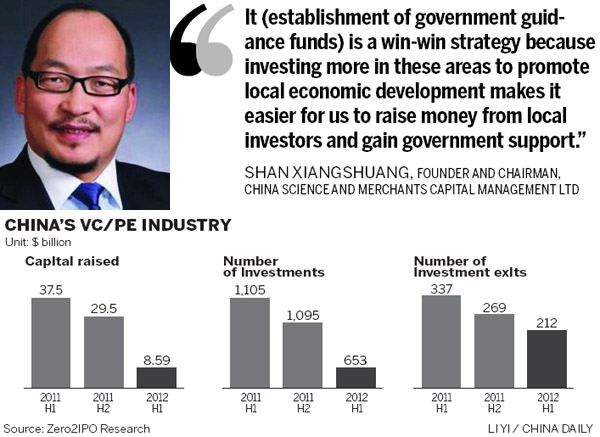Secrets of a successful PE firm
Updated: 2012-09-20 09:38
By Cai Xiao (China Daily)
|
||||||||
China Science and Merchants Capital Management attracts attention with its portfolio of winning deals
Thirty-eight newly launched funds, 111 investment deals totaling 11.2 billion yuan ($1.76 billion) and 11 successful applications for initial public offerings by companies it invested in.
That's the track record of Beijing-based private equity firm China Science and Merchants Capital Management Ltd, also known as CSM Group, in 2011 alone. It drew the attention of the whole Chinese venture capital and PE market with its outstanding investment performance over the course of the year.
|
 Venture capital and private equity firms in China are eyeing small and micro companies and those in crisis. [Photo/China Daily] |
In the first half of this year, of 104 companies that went public in China, four were invested in by CSM Group.
Shan Xiangshuang, the 45-year-old founder and chairman of CSM Group, told China Daily that although other players in the industry had their doubts, he was not surprised with the compelling investment achievement of his company, because it has 13 years of experience in China and has developed many successful tactics specific to China.
"In the past 10-plus years, we have positively sought out private entrepreneurs as our LPs (limited partners) and given them power to make decisions in the deals in which we invest," Shan said.
Shan said that LPs in the West are usually managers of large institutions such as pension funds. However, in China they are mostly private entrepreneurs who are very hard-working and show great interest in the activities of the equity investment funds into which they put money.
"Consequently we invite entrepreneurs who are the main LPs of our equity investment funds into the decision-making commissions and they can be very helpful when the deals we are going to invest in are in the fields in which they have expertise," said Shan.
"Unlike many VC and PE firms in China, we set up regional offices and look for local partners with good resources to join us, which helps us find investing deals faster and better," Shan said.
Business development
Shan graduated from Xiamen University as an accountancy student and started his career in government, becoming a low-level official in China Communications Import and Export Co when he was 25.
During his leisure time he wrote novels. Now his interest is in art and film.
In 1998 he became determined to seek business opportunities in Shenzhen and found a job in a securities company. Later, he initiated an investment and financing commission under the management of the China Communications and Transportation Association and a venture capital investment research center at Peking University.
|
 |
In 2000, when China's growing enterprise market - currently ChiNext, which is the nation's Nasdaq-style stock market - was expected to open, he set up CSM Group with just 600,000 yuan in available funds. He and his team succeeded in raising the cash pile to 300 million yuan from five large enterprises within four months. They included State-owned audio and video company China Hualu Group, and Erdos Group, a company with interests in cashmere, coal, electricity, metallurgy and chemistry.
"We paid attention to cooperating with local governments from 2006 and set up government guidance funds together. It is a win-win strategy because investing more in these areas to promote local economic development makes it easier for us to raise money from local investors and gain government support," said Shan.
He cited Guangdong as an example. Guangdong CSM Venture Capital Management Co Ltd, a subsidiary of CSM Group, and Guangdong provincial government set up CSM Baiyun Fund in 2009 with 5 billion yuan. As much as 1.1 billion yuan of the total was invested in 19 projects mainly in Guangdong in advanced manufacturing and agriculture.
That sum would yield at least 3.58 billion yuan with a net internal rate of return of nearly 48 percent.
Fifty million yuan from the CSM Baiyun Fund was invested in Guangzhou Xiangxue Pharmaceutical Co Ltd in 2009 for a 6.8 percent stake. The company listed in 2010 on ChiNext and CSM received more than quadruple its investment in return.
Shan said his company set up the CSM Baiyun II Fund this year, which aims to raise 10 billion yuan. So far it has 2.5 billion yuan in its account.The fund operator said there are many opportunities in China's villages and towns but few venture capitalists have looked there. CSM Group set up two funds totaling 750 million yuan in Zhouzhuang, a town under the jurisdiction of Jiangyin city, Jiangsu province, in 2010 and has made more than 10 deals valued at more than 700 million yuan.
|
 Zhouzhuang, a scenic spot in Jiangsu province. China Science and Merchants Capital Management Ltd cooperates with the local government to jointly set up funds. [Photo/China Daily] |
Government guidance funds at town level became increasingly popular after the successful example in Zhouzhuang. Officials in seven other towns in Jiangyin contacted CSM Group to establish funds. In 2011, six such funds were set up in Zhongshan city, in Guangdong province, totaling 3 billion yuan.
In addition to branches in Beijing, Tianjin, Shanghai, Shenzhen and the provinces of Guangdong, Jiangsu, Anhui and Fujian, CSM Group has set up offices in the United States and Europe.
Since 2000, with its initial funds of 600,000 yuan, Shan has led CSM Group to become a company with 88 funds totaling more than 50 billion yuan committed to their management from their LPs, including more than 30 billion yuan now in accounts.
China was home to more than 10,000 VC and PE firms managing nearly 2 trillion yuan in assets at the end of last year, according to Liu Jianjun, an official at the National Development and Reform Commission's fiscal and financial affairs department.
CSM Group's archrivals include Shenzhen Capital Group Co Ltd, which now has 47 government guidance funds, 29 commercial funds and three Sino-foreign joint venture funds with a total value of 11.4 billion yuan across China.
Jin Haitao, chairman of the firm, said that the establishment of government guidance funds can make financing easier and broaden marketing channels.
Last year the company invested in 84 companies to the tune of 2.7 billion yuan. Eleven of them listed successfully.
Nanjing-based VC firm Govtor Capital Group received 55 million yuan from the Ministry of Science and Technology to build its high-tech-based small and medium-sized enterprise fund.
"The fund is operating well and we have invested in 11 companies. The government will remove its original investment funds without taking any profit to encourage the development of technology-based SMEs," Zhang Wei, chairman of Govtor Capital Group, told China Daily. The firm has 41 funds totaling more than 20 billion yuan under management.
Small companies
Shan said he is interested in small and micro companies and those in crisis.
Sumavision Technologies Co Ltd, founded in 2000, was listed on the Shenzhen Stock Exchange in 2010 and has been a leading provider of video delivery in China. But in 2003, when the company's founder Zheng Haitao met Shan, Zheng had only tens of thousands of yuan in its accounts and was finding it difficult to pay workers' salaries.
Shan said Tsinghua University graduate Zheng impressed him because of his devotion to work and his moral qualities so he decided to invest 25 million yuan in Sumavision, buying a 35 percent stake in the company in 2004. In September 2010, CSM was expected to receive a return of about 470 million yuan.
Shan said every year his company invests in dozens of small companies, often making micro deals. The return can be considerable.
Dalian Machine Tool Group was financially embarrassed in 2009 by the global financial crisis. Previous investors had a disagreement with the company's management team and withdrew their funds. Shan organized other VC and PE firms and invested 800 million yuan in the company, of which 310 million yuan came from CSM Group.
With value-added services from CSM and other investors, the profit of Dalian Machine Tool Group totaled 400 million yuan in 2009. The company will seek an initial public offering in September this year.
According to Shan, CSM's investment costs are low largely because they conduct many deals with small and micro companies as well as those trapped in crisis.
On the outlook for the Chinese VC and PE market, he said: "Ninety percent of the companies will die in five years and 10 percent will survive. Fewer than 1 percent (fewer than 100 companies) will be strong."
According to Shan, it is important to have large and diversified limited partnerships. If a VC or PE firm has fewer than 10 LPs it may risk a financing shortage because limited partners themselves may face difficulties when market cycles or policies change.
"Good VC and PE firms should develop their strengths in providing value-added services by striving to create industry, capital and talent networks," he added.
caixiao@chinadaily.com.cn











